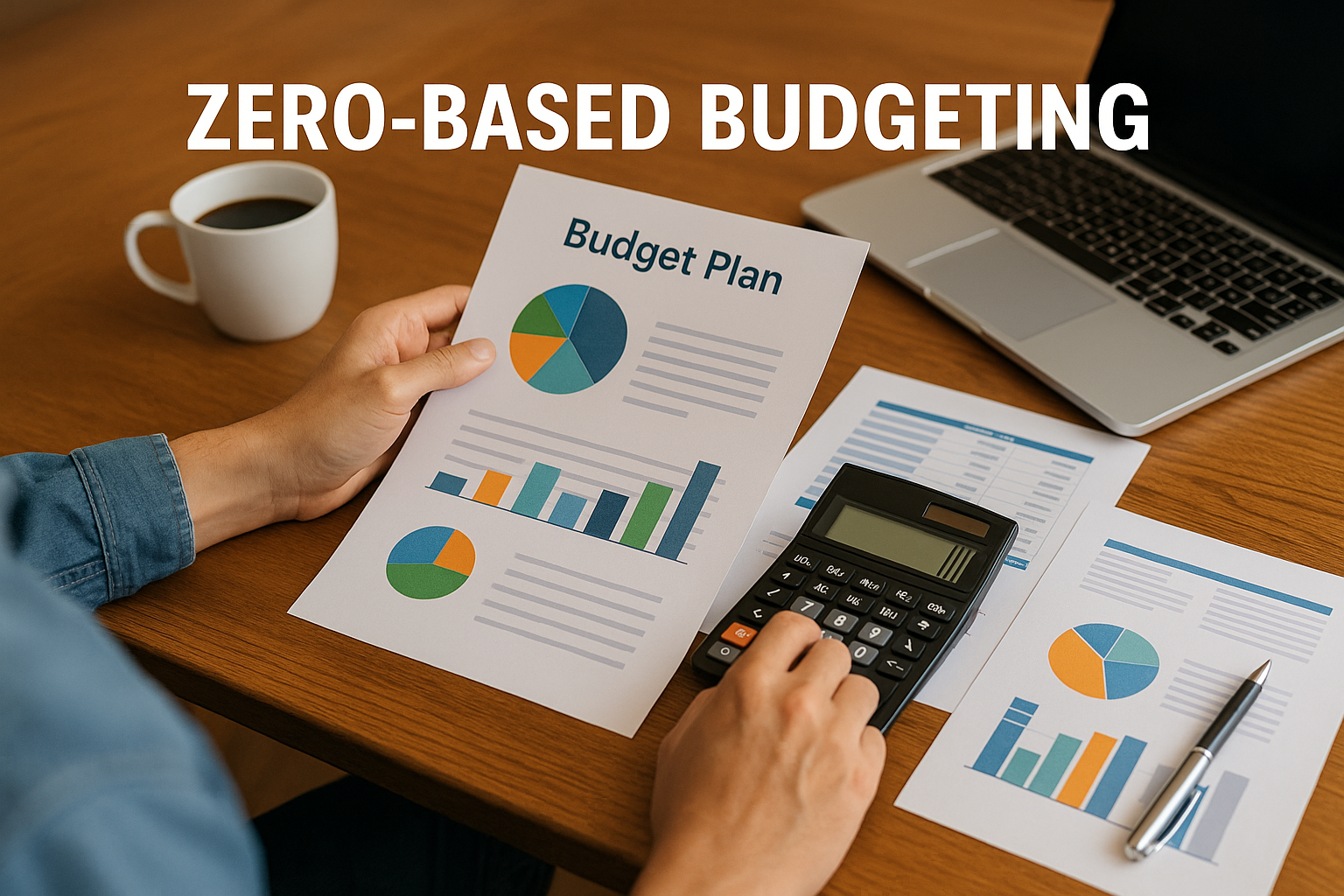In the world of personal finance, there’s one strategy that stands out when it comes to maximizing control over your money and eliminating waste: Zero-based budgeting (ZBB). Whether you’re looking to save more, pay down debt, or simply get a better handle on your finances, Zero-based budgeting offers a structured approach to help you reach your financial goals. This article will explore exactly what Zero-based budgeting is, how it works, and why it’s one of the best budgeting strategies to control expenses.
What Is Zero-Based Budgeting and How Does It Work?
Zero-based budgeting (ZBB) is a method of budgeting where every dollar is assigned a specific job. Rather than basing your budget on previous spending patterns or estimates, with ZBB, you start with a clean slate each month. The goal is to allocate funds to essential expenses first, ensuring that every dollar is “spent” or saved with purpose.
In simple terms, your income minus your expenses should equal zero. This means that if you earn $3,000 a month, you should plan exactly how each of those $3,000 will be used—whether it’s for bills, savings, or entertainment. There’s no room for excess or under-allocating; everything needs to be accounted for.
The Core of Zero-Based Budgeting
-
Start from Zero: Begin each month with no pre-existing assumptions about how much you spent last month or how much you should spend this month.
-
Identify and Prioritize Needs: Categorize your spending into essentials like rent, groceries, utilities, and debt payments, then allocate funds to each category. Non-essential expenses should be minimized.
-
Review and Adjust: At the end of the month, assess whether you adhered to your plan, and make adjustments for the next month.
By continually reviewing and adjusting your budget, you have full control over your finances, ensuring that you don’t overspend on unnecessary expenses.
Why Zero-Based Budgeting is One of the Best Budgeting Strategies to Control Expenses
Zero-based budgeting offers several distinct advantages that make it an effective strategy for reducing unnecessary spending and keeping your finances in check. Let’s dive deeper into why it’s considered the best budgeting strategy to reduce monthly expenses.
1. It Forces Financial Discipline
One of the main benefits of Zero-based budgeting is that it promotes strong financial discipline. By categorizing every dollar, you are forced to be more intentional with your money. There is no room for impulsive spending, as everything you spend must be justified and accounted for. Over time, this increases your awareness of where your money is going, ultimately leading to better financial habits.
2. Clearer Financial Goals and Prioritization
Another major advantage of ZBB is that it helps you set clear financial priorities. You can clearly define your goals—whether it’s paying down credit card debt, saving for a family vacation, or building an emergency fund—and allocate your resources accordingly. This way, you’re less likely to waste money on non-essential items and more likely to put your funds toward achieving your personal financial goals.
3. Prevents Overspending and Budget Fatigue
Zero-based budgeting keeps you accountable by assigning a specific amount of money to each category. When the budget for a particular category is used up, you’re done. This reduces the temptation to overspend on discretionary items. Unlike traditional budgeting methods, which might allow some flexibility in spending, ZBB keeps you firmly within your allocated limits.
How to Use Zero-Based Budgeting for Personal Finance
If you’re ready to adopt Zero-based budgeting, follow this simple step-by-step guide to help you take control of your financial future.
Step 1: List Your Monthly Income
Start by listing all sources of income, including your salary, freelance work, or side hustles. This gives you a clear picture of how much money you have to allocate each month.
Step 2: Identify Essential Expenses
Next, categorize your essential expenses. These include your rent or mortgage, utilities, insurance premiums, groceries, transportation, and any mandatory loan payments. These expenses must be prioritized.
Step 3: Allocate Money to Each Category
Once your essential expenses are covered, start allocating money to non-essential categories such as entertainment, dining out, subscriptions, or savings. It’s important to be realistic about what you can afford, considering your financial goals and current obligations.
Step 4: Review and Adjust Monthly
At the end of each month, review your actual spending against your planned budget. This review allows you to identify areas where you over- or under-spent and adjust accordingly for the next month.
Step 5: Track and Refine
Tracking your progress is key. Use budgeting apps or spreadsheets to help monitor your expenses. Over time, you’ll become more familiar with your spending patterns, and this will help you refine your budget and reduce waste.
Benefits of Zero-Based Budgeting for Families
Zero-based budgeting isn’t just for individuals. In fact, it can be an incredibly effective budgeting technique for families. With family budgets often containing numerous moving parts—from children’s activities to household expenses—ZBB offers a great way to gain control and ensure money is being allocated wisely.
Better Expense Management
When you’re juggling multiple incomes and expenses, it’s easy for some costs to get lost in the shuffle. ZBB forces families to account for every dollar, reducing the risk of forgotten or overlooked expenses.
Encourages Family Financial Discipline
By involving the entire family in the budgeting process, everyone can see where money is going and why certain expenses are prioritized. This shared understanding helps cultivate financial discipline across the household.
Aligns Spending with Family Goals
Families can use Zero-based budgeting to align spending with shared financial goals, whether it’s saving for a down payment on a house, funding a child’s education, or taking a family vacation.
Zero-Based Budgeting vs Traditional Budgeting Methods
Many people rely on traditional budgeting methods, which typically involve looking at past spending to estimate future costs. While these methods can provide useful insights, they also leave room for error and inefficiencies. Let’s compare Zero-based budgeting with traditional budgeting techniques to see how they differ.
Traditional Budgeting
Traditional budgeting methods usually work by setting a budget based on your last month’s spending. You might allocate 30% to housing, 15% to groceries, 10% to savings, and so on. This can work well if your spending is fairly stable but often doesn’t take into account changing priorities or financial goals.
Zero-Based Budgeting
With Zero-based budgeting, there is no reliance on previous months. Each expense must be justified from scratch, ensuring that you allocate money based on your current needs and goals. It’s a more proactive approach that eliminates waste and prioritizes your financial objectives.
Key Differences:
-
Flexibility: Traditional budgets often allow for flexible spending in certain categories. ZBB forces you to be rigid with your allocations.
-
Awareness: ZBB increases awareness by requiring you to consider every single expense, while traditional budgeting can sometimes overlook smaller, irregular costs.
Frequently Asked Questions (FAQs) on Zero-Based Budgeting
1. What is zero-based budgeting and how does it work?
Zero-based budgeting is a budgeting method where every dollar is assigned to a specific expense, savings, or financial goal. The goal is to ensure that your income minus your expenses equals zero, meaning you allocate every penny.
2. How does zero-based budgeting help control overspending?
By assigning a fixed amount of money to each expense category, ZBB prevents impulse purchases. Once you’ve used up your budget for a category, there’s no more room to spend in that area.
3. How can I use zero-based budgeting for personal finance?
To use ZBB for personal finance, list your income, prioritize essential expenses, allocate funds to non-essentials, and track your spending. Adjust your budget each month to optimize your financial habits.
4. What are the benefits of zero-based budgeting for families?
For families, ZBB provides clarity on how money is being spent and helps align household spending with shared financial goals. It’s an effective way to manage a complex family budget while promoting financial discipline.
5. How does zero-based budgeting compare to traditional budgeting methods?
Zero-based budgeting is more rigid and detailed compared to traditional budgeting, which often relies on past spending. ZBB forces you to justify every expense from scratch, making it more proactive.
6. What are some common mistakes to avoid with zero-based budgeting?
Some common mistakes include not accounting for irregular expenses, not reviewing your budget regularly, and over-allocating funds to non-essential categories. Always adjust and refine your budget as needed.
Conclusion
Zero-based budgeting is an excellent financial strategy for anyone looking to take full control of their spending. Whether you’re managing personal expenses or budgeting for your entire family, ZBB provides a structured, intentional approach to money management. By starting from zero each month and allocating every dollar with purpose, you’ll develop better financial discipline, eliminate waste, and achieve your financial goals faster.








Comments (0)